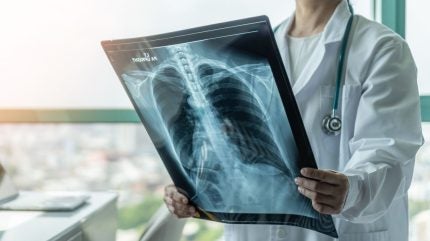
Endeavor BioMedicines has revealed results from the Phase IIa clinical trial where ENV-101 demonstrated to improve lung function in idiopathic pulmonary fibrosis (IPF) patients.
ENV-101 is engineered to inhibit the Hedgehog (Hh) pathway, which is overactive in fibrotic lung diseases and leads to the progressive accumulation of scar tissue.

Discover B2B Marketing That Performs
Combine business intelligence and editorial excellence to reach engaged professionals across 36 leading media platforms.
The double-blind, randomised, placebo-controlled study assessed the safety and efficacy of ENV-101 compared to a placebo in 41 IPF patients.
Conducted across 16 sites in five countries, participants were assigned to receive either a 200mg dose of ENV-101 or a placebo daily for 12 weeks.
In September last year, the company concluded subject enrolment in the Phase IIa trial of ENV-101 (taladegib) to treat IPF.
The trial’s primary goal was to evaluate the safety of ENV-101.

US Tariffs are shifting - will you react or anticipate?
Don’t let policy changes catch you off guard. Stay proactive with real-time data and expert analysis.
By GlobalDataMeasuring changes in lung function from the trial’s start to week 12 alongside patient-reported outcomes from the UCSD shortness-of-breath questionnaire were the trial’s secondary endpoints.
The results showed that ENV-101 led to significant improvements in lung function and reversed key fibrosis markers over the trial period.
Patients treated with the therapy exhibited a statistically significant mean improvement in per cent predicted FVC (ppFVC) of 1.9% from baseline, compared to a mean decline of 1.3% in the placebo group.
Additionally, ENV-101 recipients saw a significant increase in total lung capacity (TLC) by a mean increase of 200mL at 12 weeks, against a mean decrease of 56mL for those on placebo.
In the ENV-101 group, 80% of patients experienced a TLC increase while 70% of placebo recipients saw a decrease.
The treatment also significantly reduced the absolute percent of quantitative interstitial lung disease (QILD) by 9.4% from baseline, compared to a 1.1% increase in the placebo group (P<0.05).
ENV-101 was found to be well-tolerated in the trial without any serious adverse events, grade 3 or 4 adverse events, or significant safety concerns.
Dysgeusia, alopecia and muscle spasms were reported to be the most frequently seen mild to moderate adverse events linked to ENV-101.
Endeavor BioMedicines chief medical officer Paul Frohna said: “These trial results suggest ENV-101 could have transformational clinical benefits for individuals with IPF, who are in need of therapies that change treatment expectations – from slowing disease progression to potentially reversing it. “We look forward to further evaluating ENV-101’s potential in the upcoming WHISTLE-PF clinical trial.”





